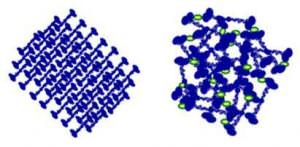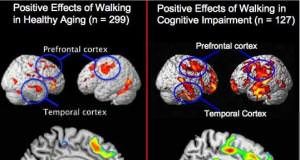Tai Chi Beats Back Depression in the Elderly, Study Shows
The numbers are, well, depressing: More than 2 million people age 65 and older suffer from depression, including 50 percent of those living in nursing homes. The suicide rate among white men over 85 is the highest in the country -- six times the national rate. And we're not getting any younger. In the next 35 years, the number of Americans over 65 will double and the number of those over 85 will triple.
Trouble With The Latest Dance Move? GABA Might Be To Blame
If you tend to have trouble picking up the latest dance moves or learning to play a new piano piece, there might be an explanation. A new study published online on March 3rd in Current Biology, shows that people who are fast to learn a simple sequence of finger motions are also those whose brains show large changes in a particular chemical messenger following electrical stimulation.
Signaling Path In Brain May Prevent That ‘I’m Full’ Message
Researchers at UT Southwestern Medical Center have identified a signaling pathway in the brain that's sufficient to induce cellular leptin resistance, a problem that decreases the body's ability to "hear" that it is full and should stop eating.
Acupressure Effective In Helping To Treat Traumatic Brain Injury, Study Suggests
A new University of Colorado Boulder study indicates an ancient form of complementary medicine may be effective in helping to treat people with mild traumatic brain injury, a finding that may have implications for some U.S. war veterans returning home.
High Cholesterol And Blood Pressure In Middle Age Tied To Early...
Middle-age men and women who have cardiovascular issues, such as high cholesterol and high blood pressure, may not only be at risk for heart disease, but for an increased risk of developing early cognitive and memory problems as well. That's according to a study released Feb. 21 that will be presented at the American Academy of Neurology's 63rd Annual Meeting in Honolulu April 9 to April 16, 2011.
Look After Your Brain
As the average life span becomes longer, dementia becomes more common. Swedish scientist Laura Fratiglioni has shown that everyone can minimize his or her risk of being affected. Factors from blood pressure and weight to the degree of physical and mental activity can influence cognitive functioning as one gets older.
Alzheimer’s: Therapy For Brain Disease Could Target Blood
The aggregated proteins strewn about the brain are the hallmark of one of the most common neurodegenerative disorders: Alzheimer's disease. But while these irregular, gunky proteins, called amyloid-β, are believed to contribute to the deterioration of memory and cognitive ability in Alzheimer's patients, no one knows how they lead to these symptoms, and the severity of the dementia doesn't directly depend on the amount of amyloid-β plaques found in diseased brains.
Alzheimer’s Disease: Are Plaques and Tangles A Symptom, Not the Cause?
Karl Herrup thinks that the national research effort to understand Alzheimer's disease has gone about as far as it can go with its current theories. And that's not far enough. Alzheimer's disease is an incurable, degenerative, eventually fatal disease that attacks cognitive function. It affects more than 26 million people around the world and is the most common form of dementia among people over the age of 65.
Walking Slows Progression of Alzheimer’s, Study Suggests
Walking may slow cognitive decline in adults with mild cognitive impairment (MCI) and Alzheimer's disease, as well as in healthy adults, according to a study presented November 29 at the annual meeting of the Radiological Society of North America (RSNA).
Boosting Supply Of Key Brain Chemical Reduces Fatigue In Mice
Researchers at Vanderbilt University have "engineered" a mouse that can run on a treadmill twice as long as a normal mouse by increasing its supply of acetylcholine, the neurotransmitter essential for muscle contraction. The finding, reported this month in the journal Neuroscience, could lead to new treatments for neuromuscular disorders
Compound Derived From Curry Spice Is Neuroprotective Against Stroke And Traumatic...
A synthetic derivative of the curry spice turmeric, made by scientists at the Salk Institute for Biological Studies, dramatically improves the behavioral and molecular deficits seen in animal models of ischemic stroke and traumatic brain injury (TBI). Two new studies suggest that the novel compound may have clinical promise for these conditions, which currently lack good therapies.
New Method For Preventing Oxidative Damage To Cells: Findings Could Lead...
The discovery by UCLA biochemists of a new method for preventing oxidation in the essential fatty acids of cell membranes could lead to a new class of more effective nutritional supplements and potentially help combat neurodegenerative disorders such as Parkinson's disease and perhaps Alzheimer's.















